- 1. Visit the DTI website
- 2. Accomplish the ‘Owner’s Information’ form
- 3. Click ‘Proceed’ after the pop-up
- 4. Identify the business scope
- 5. Select a ‘Dominant Name’
- 6. Select a Business Descriptor
- 7. Check Name Availability
- 8. Confirm details to be assigned a reference code
- 9. Fill Out Business Details
- 10. Review all details and make sure that there are no typographical errors or false information
- 11. Confirm Details
- 12. Pay the registration and transaction fees
- 13. Download the certificates at ‘Transaction Inquiry’
- 14. Print the DTI Certificate
- 1. After printing the certificate, do I need to go to the DTI office for authentication?
- 2. I’m a freelancer/online seller, do I still need to register my business?
- 3. How can I check if a company name is available in DTI?
- 4. Aside from the DTI business registration, what else should I secure to start my business correctly?
- 5. How do I make a correction on my business name registration?
- 6. Is it still possible to apply manually through a physical office?
What Is a Business Name?
According to the Department of Trade and Industry (DTI), a business name is a name you give to your enterprise that is different from your birth name and shall be used in any transaction connected to your business.
This business name will appear on any written or printed receipts, written or printed evidence of the business transaction, or any sign or billboard announcing the business.
In order to be registered with DTI, your business name must have the following:
- The Dominant Name is the main portion of your business name. It is unique to your business and is usually composed of a word, group of words, or a mixture of numbers and letters.
- The Business Name Descriptor describes the nature of your business and gives people an idea of what kind of product or service you’re selling.
For example, in the business name Stone Press Content Writing Services, the Stone Press is the dominant portion while the Content Writing Services is the descriptor that gives a clue to what the business is all about.
Is Business Name Different From Trade Name?
Yes. Whereas the business name is your business’s legal name that will appear on all business and government paperwork, it’s the trade name that the public will see through your marketing and sales activities.
Think of the business name as your birth name while the trade name as your nickname. The trade name, also commonly known as the brand name, is what you want the public to remember and is the focus of all your branding efforts.
The name Kodak, for example, is a trade name while the business behind this globally recognized brand is known legally for its business name, the Eastman Kodak Company.
Another familiar example of a trade name is McDonald’s. In the Philippines, the master franchise of this multinational fast-food giant is held by a company with a registered business name, Golden Arches Development Corporation.
The process of driving off imitators is also different depending on what name you’re dealing with. The DTI permit only gives you permission to use the exact business name you registered and prevents it from being copied by others. However, it won’t protect your trade name, logo, product names, and other identifying marks related to your business from copycats. In this case, you need to secure a trademark for each of them from the Intellectual Property Office of the Philippines (IPOPHIL) 2 .
For this reason, it’s important to remember that DTI business name registration should be completed before the trademark registration. This way, the trademark for your trade name or any product name, logo, or mark will be registered under your legal business name. The IPOPHIL will also require all the details of your business name registration with DTI before you can be qualified for trademark registration.
Why Do I Need To Register My Business Name With DTI?
The main reason why business owners register with the DTI is that they want to use a business name other than their true given name. As per the Business Name Law (Act No. 3883) 3 , nobody is allowed to use any name for a business other than his/her true name unless the said business name is registered with the DTI first.
So instead of using your default business name which is your birth name (e.g., Dolly Dela Cruz), you can give your enterprise a business-sounding name like “Aling Dolly’s Online Shop” by applying for a business name registration with DTI.
The added benefit of registering with the DTI is that no other business can use your business name. Again, this protection doesn’t cover your trademarks which you should register with the Intellectual Property Office of the Philippines.
Take note, however, that the business name registration with DTI only allows you to use the name when conducting a business. To start operating the same business, you also need to secure a business permit and other related documents discussed in this business registration guide.
Who Can Apply for DTI Business Registration?
Generally, any person running a sole proprietorship who is at least 18 years old can apply for a DTI business permit.
Foreign nationals who wish to engage in business here in the Philippines must present/upload a Certificate of Authority to Engage in Business in the Philippines during the application.
Meanwhile, if the business is a partnership or a corporation (including a one-person corporation), business name registration is done with the Securities and Exchange Commission (SEC). DTI business registration is also not necessary if you’re a freelancer or a professional who earns money by providing services to clients.
What Are the DTI Business Registration Requirements?
For online applications, there are no requirements to be presented. But for walk-in applications, you need to present a valid government ID. You can present any of the following:
For foreign nationals, additional requirements include:
- Clear certified copy of the Alien Certificate of Registration; and
- Certificate of Registration for Sole Proprietorship or Certificate of Authority to engage in business in the Philippines
For recognized refugees or recognized stateless persons, additional requirements include:
- Clear certified copy of the Certificate of Recognition issued by the DOJ-RSPPU or present the original Certificate of Recognition and submit a duplicate copy.
Foreign nationals, recognized refugees, or stateless persons who register their business online are still required to submit the additional documents listed above personally to a local DTI branch.
How Much Is the DTI Business Name Registration?
The registration fee depends on the territorial scope you picked.
The territorial scope determines where you could establish a branch and/or a sales office. So if you picked ‘Barangay’, you can only establish an office in your barangay while for ‘National’, you could create a branch or a sales office anywhere in the Philippines.
Note that the territorial scope you choose does not limit you to the areas where you can make transactions. For example, if you choose a city/municipality territorial scope, you can still do your transactions nationwide.
The following list shows the corresponding fees for each territorial scope:
*All amounts are inclusive of the 30-peso documentary stamp tax.
What Are the Guidelines for Choosing a Business Name?
The Department of Trade and Industry (DTI) requires that the business name:
- must describe the nature of your business;
- consists of any alphabets, numbers, and/or punctuation marks in English or Filipino;
- not a term or word or group of words that connote activities or norms that are unlawful, immoral, scandalous or contrary to propriety;
- not a name, words, terms or expressions used to designate or distinguish, or suggestive of quality, of any class of goods, articles, merchandise, products or services;
- not those that are registered as trade names, trademarks, or business names by any government agency authorized to register names or trademarks;
- not a name that is inimical to the security of the state;
- not composed purely of generic word or words (e.g. The Drugstore, Health Care Clinic);
- not a name which by law or regulation is restricted or cannot be appropriated (e.g. Red Cross, Red Crescent, ISIS);
- not officially used by the government in its non-proprietary functions (e.g. NBI Private Investigation Services, PNP Security Agency);
- not a name or abbreviation of any nation, intergovernmental, or international organization unless authorized by a competent authority of that nation, inter-government, and international organization;
- not ordered or declared by administrative agencies/bodies or regular courts not to be registered;
- not a name of other persons; and
- not deceptive, misleading, or misrepresenting the nature of the business (“GOLD Construction Services” where the nature of business is recruitment).
How Long Is the Validity Period of the DTI Business Name Registration?
Your DTI business name (BN) is valid for 5 years from the date of registration.
You can renew your business name without penalties from 180 calendar days prior to the expiration date (early filing) to 90 calendars days following the expiration date (regular filing). Note that the renewal fee is the same as the registration fee, meaning it’s based on your territorial scope.
If you did not renew your business name during the early and regular filing periods, you can still do it during the late filing or grace period which is up to 90 calendar days after the regular filing period. However, you have to pay an additional 50% of the registration fee as a penalty.
Your business name will be canceled by the DTI if you do not renew it within the grace period.
How To Apply for DTI Business Registration: A Step-by-Step Guide
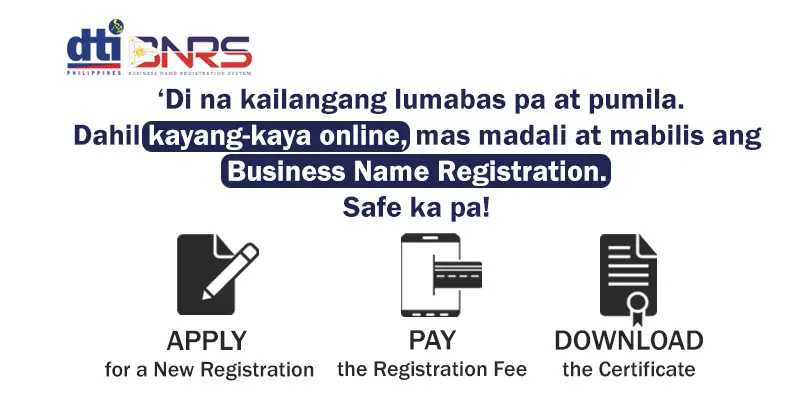
Thanks to the newly-launched BNRS Next Gen, sole proprietors can now use an online portal to submit their business name applications, pay the fees, and download the Certificate of Business Name Registration without leaving their homes.
By eliminating bureaucratic red tape, this online portal has encouraged a lot of sole proprietors to register their businesses. By the end of 2020 alone, a total of 88,000 online businesses registered 4 not in spite of but because of the pandemic that prompted DTI to strengthen its online registration system.
To register your business name 5 online with DTI, you must follow these steps:
1. Visit the DTI website
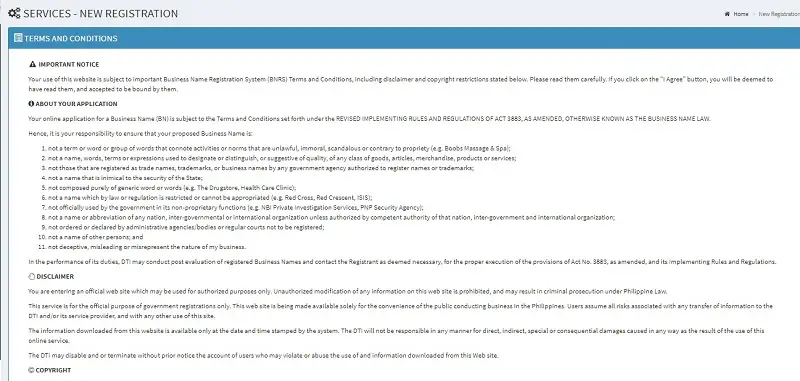
Read the Terms and Conditions then click I Agree.
2. Accomplish the ‘Owner’s Information’ form
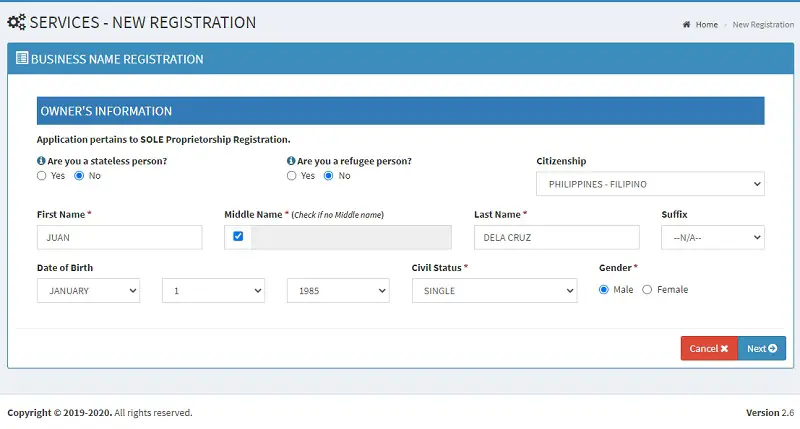
Provide your citizenship, complete name, date of birth, civil status, and gender.
Note: Applications filed by non-Philippine nationals, recognized refugees, and stateless persons shall be processed only upon submission of the applicable supporting documentary requirements at any DTI Office and payment of applicable fees.
Once done, click Next.
3. Click ‘Proceed’ after the pop-up
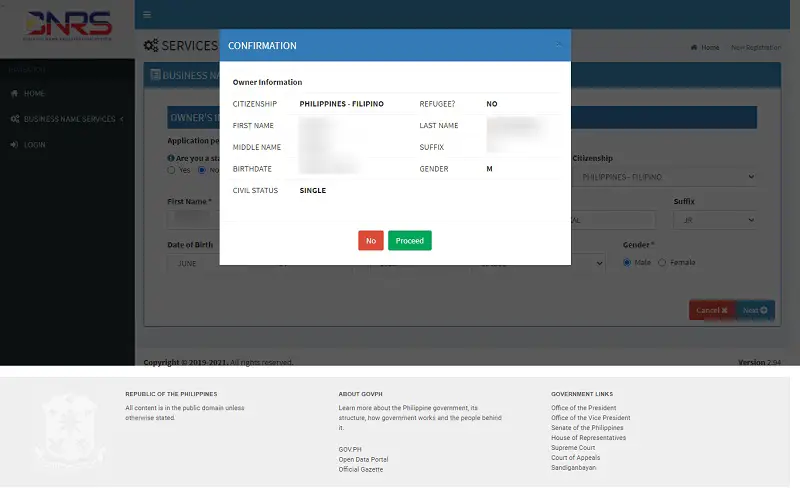
4. Identify the business scope
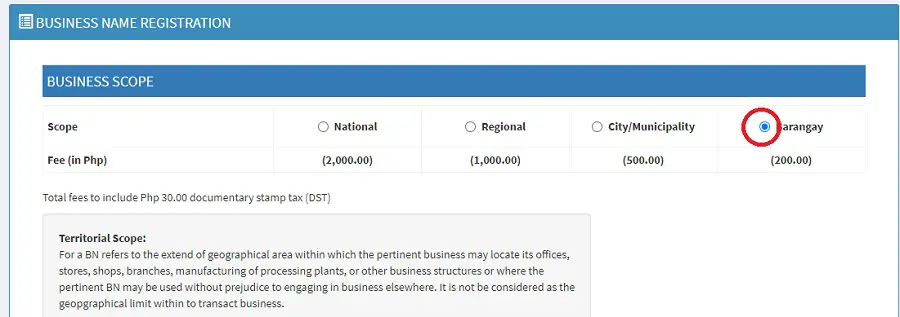
The business or territorial scope determines where your business can operate.
Choosing National allows you to establish branches, stores, and offices anywhere in the Philippines. But if you are home-based (e.g. online sellers) and do not plan to set up physical stores soon, it is advisable to only pick Barangay since it is cheaper.
Not sure which territorial scope to pick? Here are some points to consider:
- It’s possible to change your territory scope later. So, you don’t have to worry about being locked to a territorial scope. Changing your territorial scope is like a new application, you’ll receive a new business name (BN) certificate with a new validity period.
- If you don’t have a limited budget, you can err on the side of the larger scope. This is because there are reprocessing procedures and fees that you can avoid.
- If you have a limited budget, it’s okay to choose a smaller scope. When your business grows in scale, the business can pay the fees needed to move to a larger territorial scope.
5. Select a ‘Dominant Name’
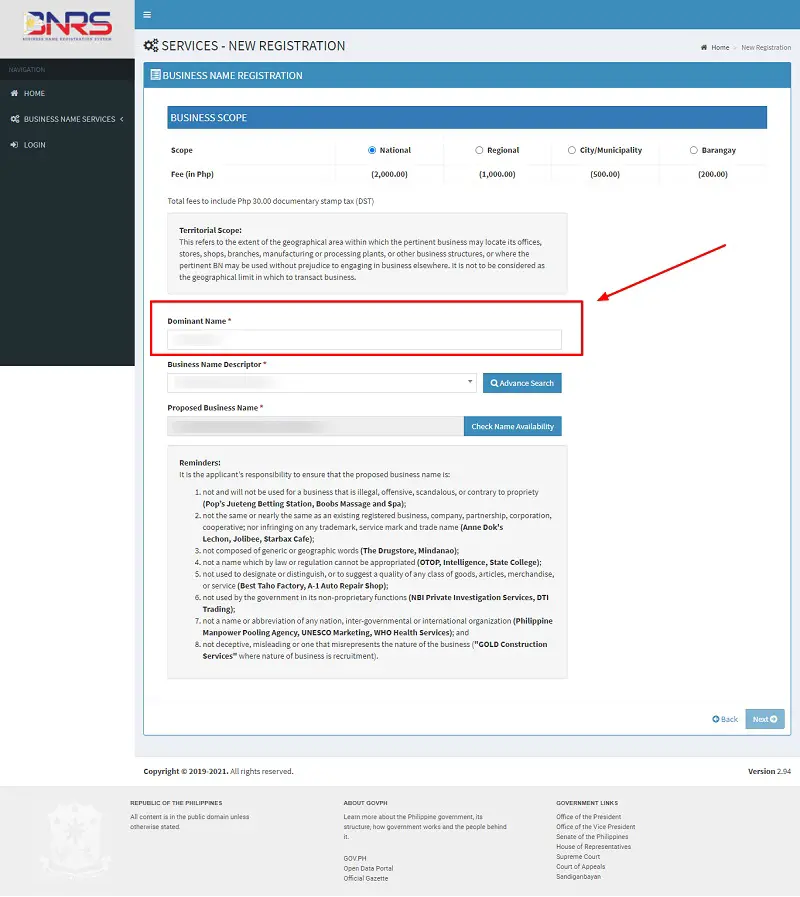
According to DTI, the Dominant Name is the “main identifying words or numerals or a combination of letters and numerals attached to your Business Name.” In simple words, it is the main name you’d like for your business (e.g. Aling Nena’s).
6. Select a Business Descriptor
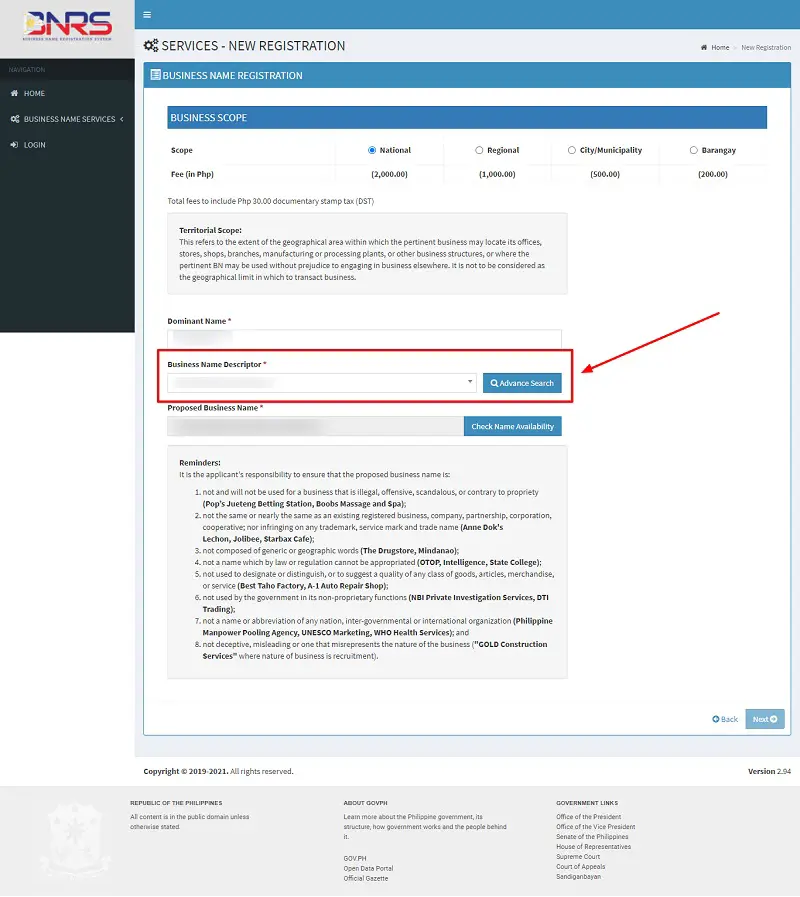
As defined by DTI, the Descriptor “describes the nature of your business based on the Philippine Standard Industrial Classification.” It allows immediate recognition of what your business is doing (e.g., Online Shop).
7. Check Name Availability
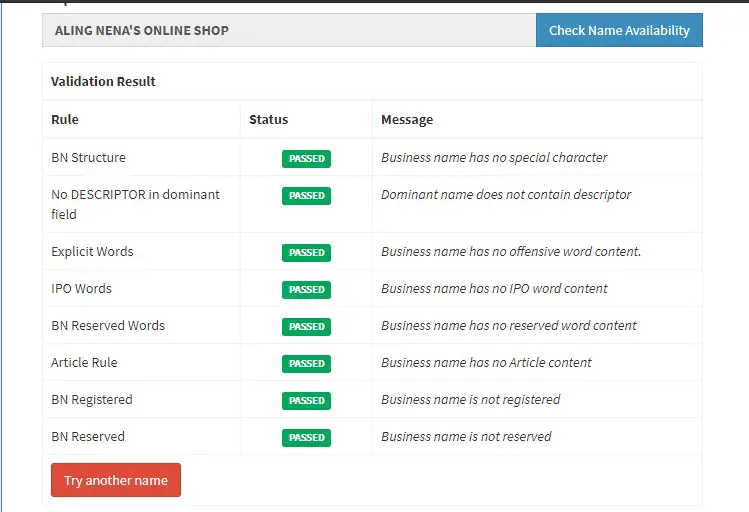
Click the Check Name Availability button beside your proposed business name. This brief verification process allows the applicant to determine if the business name is viable.
A pop-up box will then appear offering two choices on how you want your proposed business name to be arranged:
- Dominant Name – Business Name Descriptor (e.g., Aling Nena’s Online Store)
- Business Name Descriptor – Dominant Name (e.g., Online Store Aling Nena’s)
Select your preferred naming order and click Validate Business Name.
Note: Sometimes it is buggy and shows “Result not yet processed. Please click the check name availability button.” If this happens, just click the validate button again.
If the system confirms the availability of your proposed business name, click Next to continue. Otherwise, select the red Try another name button to propose another business name.
8. Confirm details to be assigned a reference code
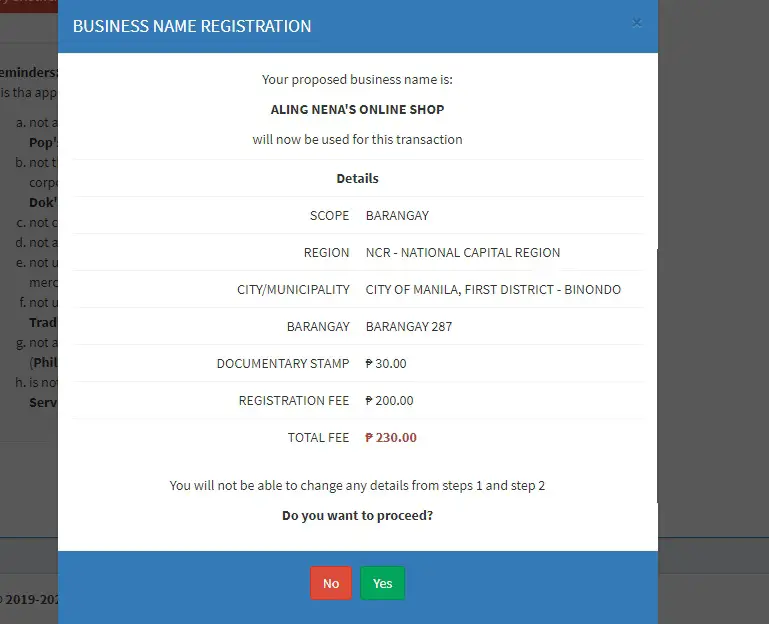
Copy or take a screenshot of the reference code that will be displayed on your screen as you will be using it in all your transaction.
Click Continue.
9. Fill Out Business Details
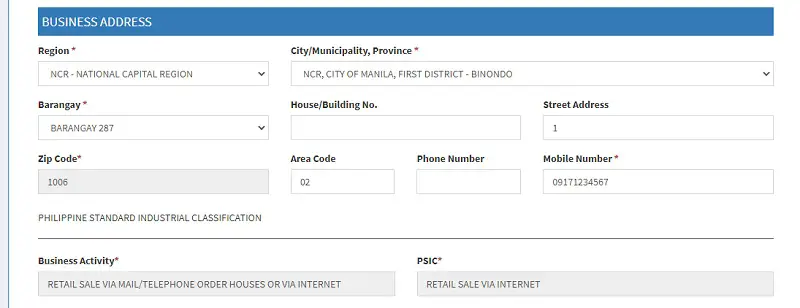
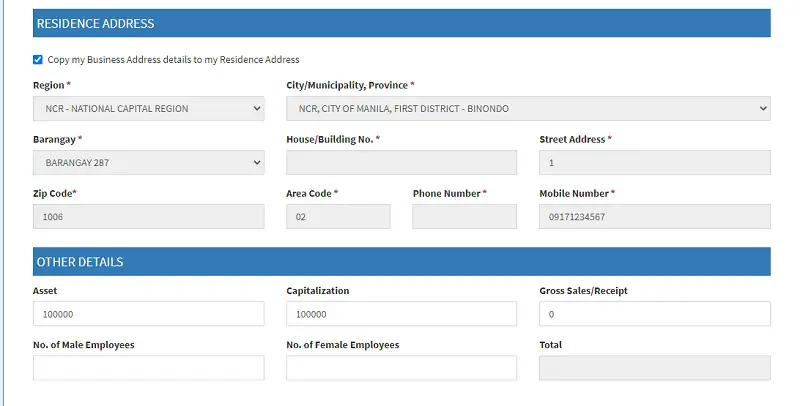
Assets are all properties owned by the business while capitalization refers to the amount of cash you are investing in the company.
10. Review all details and make sure that there are no typographical errors or false information
Once done, click Next to proceed to the next step.
11. Confirm Details

Take note that you will no longer be able to edit any details once you click the Confirm and Proceed button.
12. Pay the registration and transaction fees
This must be done within 7 days of application, otherwise, the reservation of the business name shall be revoked.
It is recommended that you pay using either GCash or PayMaya since the payment is made in real-time and will be immediately processed by the DTI.
If you have already paid your fees, but the status still shows ‘Unpaid’ then you can email [email protected] with your proof of transaction and valid government ID.
13. Download the certificates at ‘Transaction Inquiry’
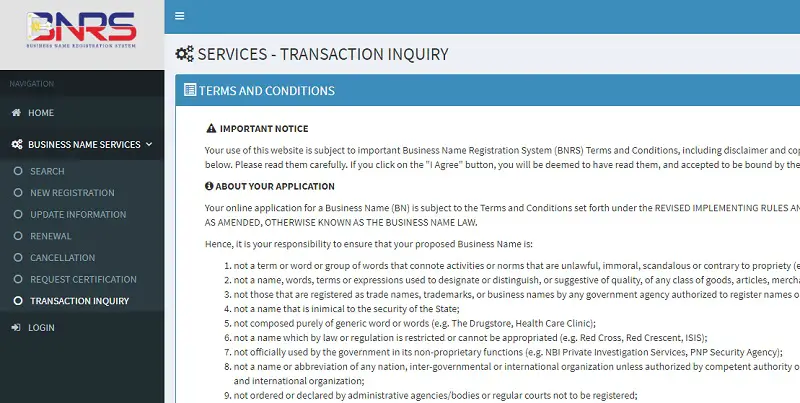
You may download your certificate by typing in your Reference Code found in Transaction Inquiry.
A verification code will be sent to the email address you provided in your registration. Use the verification code to access the Transaction Inquiry. From there, you can access your certificates under Downloadable Contents.
14. Print the DTI Certificate
You must print the documents in colored ink.
Frequently Asked Questions
1. After printing the certificate, do I need to go to the DTI office for authentication?
No. Upon receipt of the certificates and permits, you may immediately use the same for other business transactions e.g. BIR Registration and Business Permit Registration.
2. I’m a freelancer/online seller, do I still need to register my business?
Yes. As long as you are regularly earning from a source that is not under an employer-employee relationship, you should register your business.
However, if you’re a professional providing services to your clients, you may skip this step and proceed to the BIR Registration and subsequently secure a business permit.
3. How can I check if a company name is available in DTI?
You can check the availability of a business name here.
Note that you should also include the descriptor in the search box (i.e. Captain Barbell Online Shop).
4. Aside from the DTI business registration, what else should I secure to start my business correctly?
After registering your business name with the DTI, you need to:
- Register with the BIR;
- Get a business permit from your LGU;
- If you have employees, you need to register them with DOLE, SSS, PhilHealth and Pag-IBIG.
Please refer to this article for a more in-depth guide on the whole business registration process.
5. How do I make a correction on my business name registration?
If you only need to fix a typo in your business name registration, you can email [email protected] with your information, including:
- Name
- Business name
- Correction
- Government ID for validation
However, you can only do this for new registrations.
If you need to change the BN owner’s name, address, or civil status, you would need to proceed to your local DTI office or Negosyo Center with an accomplished application form.
6. Is it still possible to apply manually through a physical office?
Yes. Make sure to bring a valid government ID and then fill out the application form you can get from the local offices. There are usually multiple DTI offices in each province. You can check the list of DTI offices and Negosyo centers here.
You can also have a representative do the manual registration for you. They only need to bring a valid government ID and an authorization letter signed by you.
References
- Online business name registrations skyrocket amid pandemic: DTI. (2022). Retrieved 12 January 2022, from https://news.abs-cbn.com/business/04/26/21/online-business-name-registrations-skyrocket-amid-pandemic-dti
- Intellectual Property Office of the Philippines. (2010). Making A Mark: An Introduction to Trademarks for Small and Medium-sized Enterprises [Ebook] (p. 7). Makati City, Philippines. Retrieved from https://www.wipo.int/export/sites/www/sme/en/documents/guides/customization/making_a_mark_phil.pdf
- The Business Name Law (Act No. 3883) (1931).
- Crismundo, K. (2021). 88K new online businesses register with DTI in 2020. Retrieved 5 July 2021, from https://www.pna.gov.ph/articles/1127955
- DAO No. 18-07 Series of 2018
Miguel Antonio Dar II, CPA
Miguel Dar is a CPA and an experienced tax adviser specializing in tax audits. He gives tax advice to different start-ups and clarifies tax concerns of individual taxpayers. This includes helping clients register their businesses, training in tax and bookkeeping for start-up businesses, settling open cases, tax planning for future tax compliance, and responding to tax-related inquiries.
Copyright Notice
All materials contained on this site are protected by the Republic of the Philippines copyright law and may not be reproduced, distributed, transmitted, displayed, published, or broadcast without the prior written permission of filipiknow.net or in the case of third party materials, the owner of that content. You may not alter or remove any trademark, copyright, or other notice from copies of the content. Be warned that we have already reported and helped terminate several websites and YouTube channels for blatantly stealing our content. If you wish to use filipiknow.net content for commercial purposes, such as for content syndication, etc., please contact us at legal(at)filipiknow(dot)net